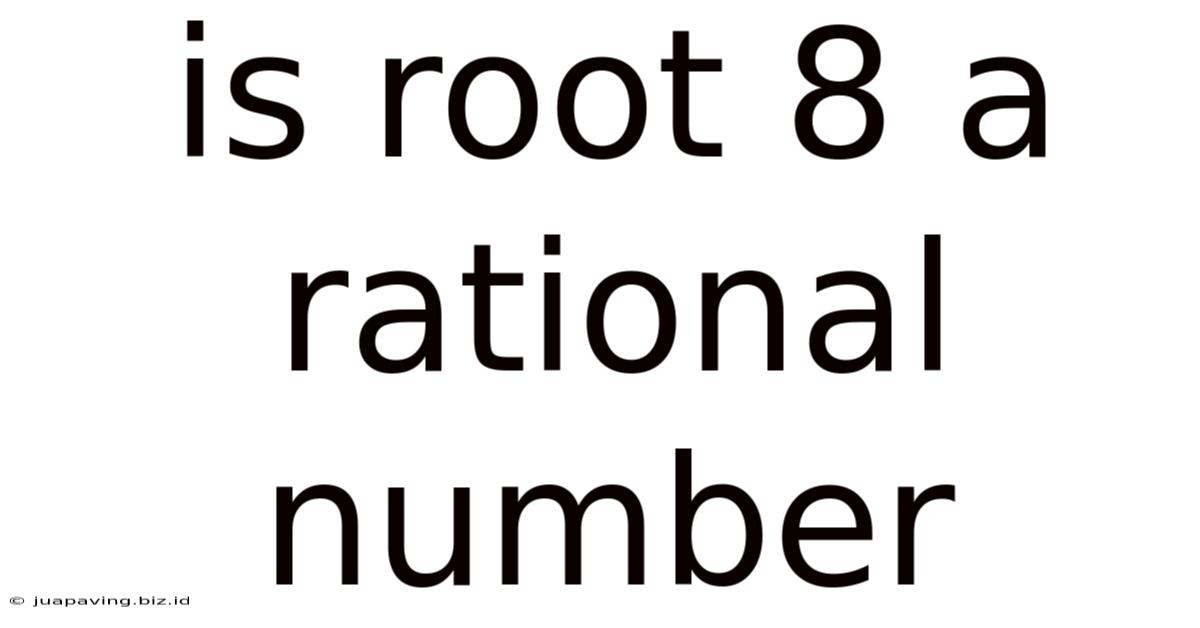Is Root 8 A Rational Number
Juapaving
May 09, 2025 · 4 min read

Table of Contents
Is √8 a Rational Number? A Deep Dive into Irrationality
The question of whether √8 is a rational number is a fundamental concept in mathematics, touching upon the core distinction between rational and irrational numbers. Understanding this distinction is crucial for anyone pursuing a deeper understanding of number systems and algebra. This article will delve into the intricacies of this question, providing a comprehensive explanation not just of the answer but also of the underlying mathematical principles. We will explore various methods for determining the rationality or irrationality of numbers, focusing on the specific case of √8.
Understanding Rational and Irrational Numbers
Before tackling the central question, let's establish a clear understanding of what constitutes a rational and an irrational number.
Rational Numbers: A rational number is any number that can be expressed as a fraction p/q, where p and q are integers, and q is not equal to zero. This means it can be represented as a terminating or repeating decimal. Examples include 1/2 (0.5), 3/4 (0.75), and -2/3 (-0.666...).
Irrational Numbers: Irrational numbers, conversely, cannot be expressed as a fraction of two integers. Their decimal representation is neither terminating nor repeating; it continues infinitely without a discernible pattern. Famous examples include π (pi), e (Euler's number), and √2.
Investigating √8: A Step-by-Step Approach
Now, let's focus on √8. To determine whether it's rational or irrational, we can employ several methods.
Method 1: Simplification and the Definition of Rational Numbers
The first step is to simplify √8. We know that 8 can be factored as 2 x 2 x 2, or 2³. Therefore, √8 can be simplified as follows:
√8 = √(2 x 2 x 2) = √(2² x 2) = 2√2
This simplification reveals a crucial element: √8 is a multiple of √2. We know that √2 is a well-established irrational number. Its decimal representation is non-terminating and non-repeating (approximately 1.41421356...). Since √2 is irrational, any non-zero multiple of √2 will also be irrational. Therefore, 2√2, and consequently √8, is irrational.
Method 2: Proof by Contradiction
A more rigorous approach involves proof by contradiction. Let's assume, for the sake of contradiction, that √8 is rational. This means it can be expressed as a fraction p/q, where p and q are integers, q ≠ 0, and p and q are coprime (meaning they share no common factors other than 1).
-
Assume √8 is rational: √8 = p/q (p and q are coprime)
-
Square both sides: 8 = p²/q²
-
Rearrange: 8q² = p²
-
Deduction: This equation implies that p² is an even number (since it's a multiple of 8). If p² is even, then p must also be even (because the square of an odd number is always odd).
-
Substitute: Since p is even, we can express it as p = 2k, where k is an integer.
-
Substitute and simplify: 8q² = (2k)² => 8q² = 4k² => 2q² = k²
-
Deduction: This equation implies that k² is an even number, and therefore k must also be even.
-
Contradiction: We've now shown that both p and k are even numbers. This contradicts our initial assumption that p and q are coprime (because both p and q would share a common factor of 2).
-
Conclusion: Since our initial assumption leads to a contradiction, the assumption must be false. Therefore, √8 cannot be expressed as a fraction p/q, and it is irrational.
Method 3: Decimal Representation
While not a formal proof, examining the decimal representation of √8 can provide intuitive support for its irrationality. Using a calculator, we find that √8 ≈ 2.8284271247... The decimal expansion continues infinitely without any repeating pattern, a characteristic feature of irrational numbers. This observation aligns with our conclusions from the previous methods.
Expanding on Irrational Numbers and Their Significance
The irrationality of √8 is not an isolated case. Many square roots of non-perfect squares are irrational. Understanding this characteristic is vital for various mathematical concepts and applications:
-
Geometry: Irrational numbers frequently appear in geometric calculations, particularly when dealing with lengths, areas, and volumes of figures involving non-right angles. The diagonal of a unit square, for example, has a length of √2, an irrational number.
-
Trigonometry: Trigonometric functions often produce irrational results, especially when dealing with angles that are not multiples of 30° or 45°.
-
Calculus: Irrational numbers are fundamental to calculus, particularly in areas like limits and integration. Many important constants in calculus, like π and e, are irrational.
-
Number Theory: The study of irrational numbers is a significant area within number theory, leading to fascinating investigations into the properties and relationships between different types of numbers.
Conclusion: The Irrefutable Irrationality of √8
Through different approaches—simplification, proof by contradiction, and observation of the decimal representation—we've definitively established that √8 is an irrational number. This understanding reinforces the fundamental distinction between rational and irrational numbers and highlights the prevalence of irrational numbers in various mathematical fields. The exploration of √8 serves as a valuable example to illustrate the power and elegance of mathematical reasoning and its application to seemingly simple questions. Remember, even seemingly straightforward inquiries can lead to profound insights into the rich tapestry of mathematical concepts.
Latest Posts
Related Post
Thank you for visiting our website which covers about Is Root 8 A Rational Number . We hope the information provided has been useful to you. Feel free to contact us if you have any questions or need further assistance. See you next time and don't miss to bookmark.